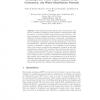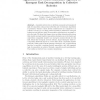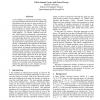651 search results - page 124 / 131 » Algorithms for Inverse Reinforcement Learning |
112
Voted
EMO
2005
Springer
15 years 7 months ago
2005
Springer
Water systems often allow efficient water uses via water reuse and/or recirculation. Defining the network layout connecting water-using processes is a complex problem which involv...
123
click to vote
ATAL
2004
Springer
15 years 7 months ago
2004
Springer
Product Distribution (PD) theory is a new framework for controlling Multi-Agent Systems (MAS’s). First we review one motivation of PD theory, as the information-theoretic extens...
137
click to vote
PPSN
2004
Springer
15 years 7 months ago
2004
Springer
A scalable architecture to facilitate emergent (self-organized) task decomposition using neural networks and evolutionary algorithms is presented. Various control system architectu...
140
click to vote
DCOSS
2008
Springer
15 years 3 months ago
2008
Springer
Energy is one of the most crucial aspects in real deployments of mobile sensor networks. As a result of scarce resources, the duration of most real deployments can be limited to ju...
120
click to vote
IJCAI
2007
15 years 3 months ago
2007
A key problem in reinforcement learning is finding a good balance between the need to explore the environment and the need to gain rewards by exploiting existing knowledge. Much ...



